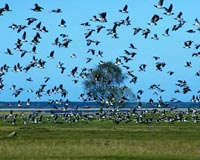| . |  |
. |
Nagoya, Japan (AFP) Oct 24, 2010 UN talks aimed at brokering a deal to protect the world's diminishing natural resources have made little progress, green groups said ahead of the summit's crucial second phase starting Monday. The 12 days of negotiations in the central Japanese city of Nagoya are aimed at securing agreement on how to stop the rapid loss of the world's plant and animal species, as well as their habitats. However, after the first week, environment groups said the conference was becoming bogged down in the same kind of acrimony between developed and developing nations that have plagued UN climate change negotiations. "What we need to see is a global alliance to protect life on earth but what we have seen so far are alarming divisions and a hardening of positions," WWF international director general Jim Leape said. Under a best-case scenario, the negotiations would wrap up on Friday with a set of agreed targets for slowing the dramatic rate of biodiversity loss by 2020. There would also be a deal on how developed countries would provide poor ones with funding to protect the world's natural habitats, plus an agreement on how to equitably share genetic resources. However, the WWF and other environment groups monitoring the event said rich and poor nations were at loggerheads over many aspects of the potential agreement. In one crucial stand-off, Brazil was insisting that no overarching deal could be reached unless there is agreement on how to share the benefits of genetic resources such as wild plants in forests that are used to make medicines. Developing countries want an "equitable share" of the profits Western companies enjoy from the natural resources. Greenpeace policy advisor Nathalie Rey, who is in Nagoya, said the talks were even going backwards in some areas. "Previously negotiated texts have been reopened and unfortunately, key biodiversity protection targets for 2020 are being watered down or weakened," she wrote in a weekend summary of the talks. "Everyone is saying that progress has been slow and painfully slow in some cases. If governments continue negotiating at this pace, there may be nothing on the plate by the end of the conference." Nevertheless, there are still hopes the talks will pick up steam when environment ministers turn up in Nagoya this week and take over from their advisers for the final three days of the summit. On the opening day of the talks last Monday, delegates from the 193 members of the UN's Convention on Biological Diversity (CBD) were told that a meaningful deal in Nagoya was crucial to save the world's biodiversity. "Business as usual is no more an option when it comes to life on Earth," CBD executive secretary Ahmed Djoghlaf said in his opening address. "We need a new approach, we need to reconnect with nature and live in harmony with nature." Delegates were told human population pressures were wiping out ecosystems such as tropical forests and coral reefs, killing off animal and plant species that form the web of life on which humanity depends. "This meeting is part of the world's efforts to address a very simple fact. We are destroying life on Earth," the UN Environment Programme's executive director, Achim Steiner, said in a speech at the opening ceremony. "We are destroying the very foundations that sustain life on this planet."
Share This Article With Planet Earth
Related Links Darwin Today At TerraDaily.com
 Asian economic boom deadly for waterbirds: study
Asian economic boom deadly for waterbirds: studyManila (AFP) Oct 21, 2010 Waterbird populations in Asia are shrinking at a faster rate than anywhere else in the world as rapid economic growth and urbanisation destroy their habitats, according to a study released Thursday. The environment for waterbirds across the world is generally poor with a decline in many populations recorded in the three decades to 2005, said the report released by Wetlands International at a ... read more |
|
| The content herein, unless otherwise known to be public domain, are Copyright 1995-2010 - SpaceDaily. AFP and UPI Wire Stories are copyright Agence France-Presse and United Press International. ESA Portal Reports are copyright European Space Agency. All NASA sourced material is public domain. Additional copyrights may apply in whole or part to other bona fide parties. Advertising does not imply endorsement,agreement or approval of any opinions, statements or information provided by SpaceDaily on any Web page published or hosted by SpaceDaily. Privacy Statement |